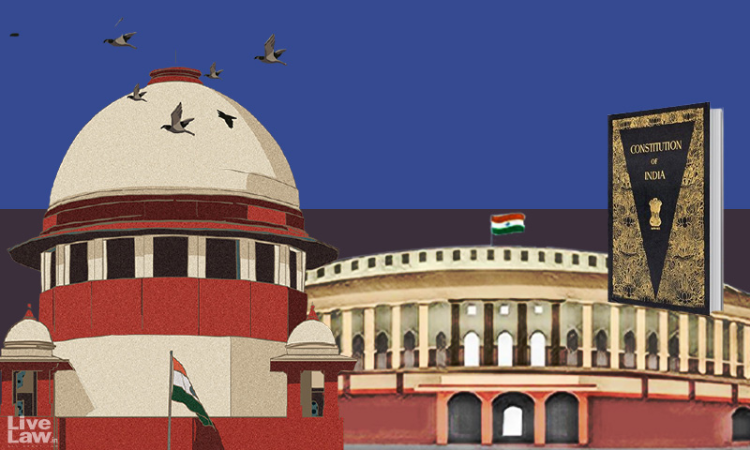
NJAC, Basic Structure Doctrine & Dhankhar’s Judicial Queries
A Constitutional Flashpoint
GK & Current Affairs for CLAT | CLAT Current Affairs 2026
Powered by CLAT Gurukul – Best online coaching for CLAT
Why in News:
The sudden resignation of Vice-President Jagdeep Dhankhar has reignited a long-standing debate over the National Judicial Appointments Commission (NJAC) Act, the Basic Structure Doctrine, and the limits of judicial accountability. His tenure was marked by repeated confrontations with the judiciary, particularly over the Supreme Court’s 2015 judgment striking down the NJAC Act. As the constitutional debate finds itself back in headlines, law aspirants and scholars are revisiting the complex interplay between Parliamentary sovereignty and judicial review.
This development is of prime importance for aspirants of CLAT 2026, particularly in the Constitutional Law and Current Affairs sections. The event combines rich legal doctrine, separation of powers, and constitutional morality—all crucial for legal reasoning and comprehension skills tested in CLAT. It is also a topical issue for law students enrolled in the best online coaching for CLAT and forms part of essential updates under “CLAT Current Affairs 2026” and “Current Affairs 2026”.
Introduction:
The controversy around the NJAC Act and the “basic structure doctrine” highlights the deep tensions between Parliament’s desire to control judicial appointments and the judiciary’s insistence on preserving its independence. At the center of this discourse is Jagdeep Dhankhar, who, during his tenure as Rajya Sabha Chairman and Vice President, consistently raised questions over judicial supremacy and the Supreme Court’s role in nullifying legislation passed unanimously by Parliament.
The present article explores Dhankhar’s criticisms, the legal and political implications of the NJAC judgment, and the doctrinal significance of the basic structure as evolved in Kesavananda Bharati v. State of Kerala (1973). This is not just a constitutional tussle, but a foundational issue in Indian democracy—Who governs: The Parliament or the Judiciary?
Point-wise Summary of the News Article:
- Dhankhar’s Controversial Tenure:
- Jagdeep Dhankhar resigned as Vice-President amid rising controversies around his remarks on the judiciary.
- He previously served as Governor of West Bengal and had repeated confrontations with the TMC government.
- Key Focus of His Criticism:
- He opposed the Supreme Court’s 2015 judgment that struck down the National Judicial Appointments Commission (NJAC) Act.
- The Act was meant to give Parliament and Executive a say in judicial appointments, which the SC said violated the basic structure of the Constitution.
- Parliamentary Sovereignty vs Judicial Supremacy:
- Dhankhar called the Supreme Court judgment a “glaring instance of compromise” on parliamentary sovereignty.
- He accused the judiciary of “usurping the mandate of the people.”
- He claimed that Parliament is the custodian of the Constitution and must be supreme over other institutions.
- Union Law Minister’s Remarks:
- A month before Dhankhar’s remarks, Union Law Minister Kiren Rijiju also criticized the collegium system, saying it lacked transparency and accountability.
- Debates on Judicial Power:
- On January 11, 2023, Dhankhar reignited the debate by referring to Kesavananda Bharati (1973), where the SC had laid down the doctrine of basic structure.
- He questioned whether Parliament could amend the Constitution without violating undefined basic principles.
- Repeated Questions on Judicial Appointments:
- At various forums (e.g., Parliament, Jaipur, Delhi University), Dhankhar consistently questioned whether judges should have the final say in their own appointments.
- He raised concerns over lack of accountability in the judiciary and absence of checks from the Legislature.
- Criticism of the Collegium System:
- He said the collegium system was not transparent and left out public oversight.
- The NJAC proposed to have a six-member body including the PM, CJI, Law Minister, and eminent persons to appoint judges.
- SC’s Firm Stand:
- The Supreme Court strongly defended its 2015 decision, stating that judicial independence is a core part of the basic structure and cannot be diluted.
- It rejected NJAC as a mechanism that compromised judicial autonomy.
- The April 22 Speech:
- After SC imposed a 3-month time limit on appointment recommendations, Dhankhar again criticized judicial overreach and questioned why judges could act without legislative oversight.
- Wider Implication for Indian Democracy:
- Dhankhar warned of a crisis where the judiciary acts with unchecked power and no political accountability.
- He called for a debate on institutional roles and checks to ensure harmony among Executive, Legislature, and Judiciary.
Legal Analysis:
- Kesavananda Bharati Judgment (1973):
- Landmark case where the basic structure doctrine was laid down.
- Held that Parliament can amend the Constitution but cannot alter its basic features, including judicial independence and separation of powers.
- National Judicial Appointments Commission (NJAC) Act (2014):
- Sought to replace the collegium system for judicial appointments.
- Was struck down in Supreme Court Advocates-on-Record Association v. Union of India (2015) for violating judicial independence.
- Collegium System:
- A judge-led body for appointing judges to higher courts.
- Not found in the Constitution but evolved through judicial precedents.
- Criticized for lack of transparency but upheld for ensuring independence.
- Basic Structure Doctrine:
- The Supreme Court’s tool to prevent Parliament from amending fundamental features of the Constitution.
- It includes elements like rule of law, judicial review, secularism, federalism, and independence of judiciary.
- Separation of Powers:
- A constitutional principle mandating separate functioning of the Legislature, Executive, and Judiciary.
- The NJAC controversy is a textbook example of tensions among these organs.
Notes: Explanation of Peculiar Terms
- Basic Structure Doctrine:
- Judicially evolved principle that certain features of the Constitution cannot be amended or destroyed by Parliament.
- NJAC (National Judicial Appointments Commission):
- A proposed body for appointing judges, consisting of government and judiciary members, struck down in 2015.
- Collegium System:
- Internal mechanism of the judiciary for recommending judges for appointment, involving the CJI and senior judges.
- Kesavananda Bharati Case (1973):
- Case that restricted Parliament’s powers to alter the Constitution’s core values.
- Judicial Review:
- Power of the judiciary to examine the constitutionality of legislative and executive actions.
- Judicial Accountability:
- Concept that judiciary, like other organs, should be responsible for its actions and decisions.
CLAT-Relevant Insights:
- Legal Reasoning: The debate on NJAC vs. Basic Structure offers real-world grounding for questions on separation of powers, constitutional supremacy, and statutory interpretation.
- Current Affairs + Law: It forms a perfect intersection of legal doctrine and current political discourse, often asked in GK + Legal Reasoning combinations.
- Ethics & Constitution: Raises significant ethical questions on checks and balances and the ideal form of governance—very relevant for essay writing and interviews.
Conclusion:
The ongoing debate surrounding the NJAC Act and the basic structure doctrine, reignited by Jagdeep Dhankhar’s vocal criticism, strikes at the heart of India’s constitutional ethos. It reveals how deeply legal doctrines are embedded in political narratives and how the interpretation of the Constitution shapes the dynamics of democracy.
For aspirants preparing with the best online coaching for CLAT, such developments offer a goldmine for analytical preparation—combining legal knowledge, current affairs, and ethical reasoning. This issue will likely remain at the forefront of India’s constitutional discourse, and hence, every serious aspirant must grasp its dimensions with clarity and depth.
This Blog is Powered by CLAT Gurukul — India’s Leading Law Entrance Prep Platform
At CLAT Gurukul, we believe in empowering future legal minds with the right blend of knowledge, strategy, and mentorship. This blog is a reflection of our commitment to quality content that not only helps aspirants stay updated but also sharpens their conceptual clarity.
Why CLAT Gurukul?
- Personalized Mentorship by Top Legal Educators
- Comprehensive Study Materials & Legal Updates
- Daily Practice Sets, Mocks & Performance Tracking
- Result-Oriented Strategy for CLAT, AILET, and CUET
Whether you’re reading this article to deepen your understanding or to stay ahead in your exam prep — you’re already one step closer with CLAT Gurukul by your side.
Join thousands of successful aspirants who trusted CLAT Gurukul and cracked India’s top law entrance exams.
Visit https://www.youtube.com/@CLATGurukul/shorts to learn more or speak to our experts now!
Note from CLAT Gurukul
At CLAT Gurukul, we are committed to providing free CLAT study material, including CLAT current affairs, legal reasoning practice sets, general knowledge updates, logical reasoning questions, English comprehension exercises, and more — all curated by top mentors.
Our blog section is regularly updated with high-quality CLAT content tailored to match the evolving pattern of the CLAT UG exam. Whether you’re looking for CLAT 2026 current affairs, CLAT legal reasoning passages, or mock practice sets, we have you covered.
We believe in open-access learning and will continue to publish free CLAT preparation resources to help serious aspirants succeed.
Explore more free content under categories like:
Best online coaching for CLAT, CLAT current affairs, CLAT GK updates, CLAT legal updates, CLAT logical reasoning, and CLAT English preparation.
For structured learning, daily mocks, and expert mentorship, visit https://www.youtube.com/@CLATGurukul/shorts — the Best CLAT Coaching in Patna and India’s most trusted platform for CLAT online coaching.




